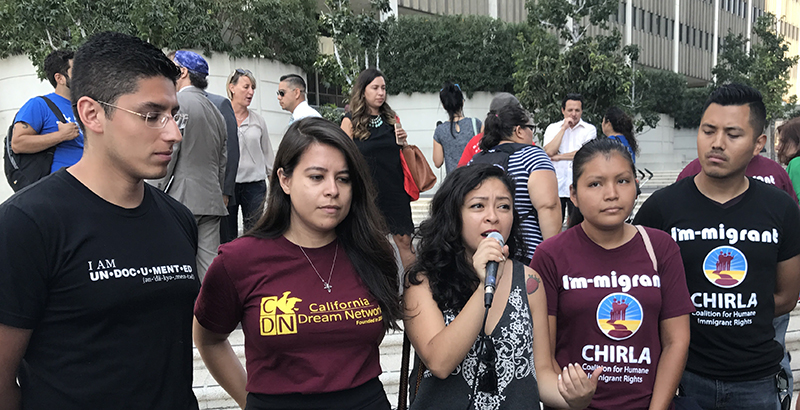New California Laws Ensure Schools Remain Safe Spaces for Students and Parents — Regardless of Immigration Status

This article was produced in partnership with LA School Report
Undocumented students are missing school. Parents aren’t showing up to school events. College students aren’t re-enrolling. Discrimination complaints are exploding.
As DACA protections come to an end, California education advocates are redoubling their efforts to make sure immigrant families know their rights and students continue their schooling. They are also stepping up pressure on Congress to pass the Dream Act in 2018.
Last month, “Dreamers” and members of the Coalition for Humane Immigrant Rights (CHIRLA) and the California Dream Network (CDN) held a “call-in marathon” from locations throughout California, including Los Angeles university campuses such as Cal State LA, UC Irvine, Rio Hondo College, and LA Trade-Tech.
“We’re seeing that not as many parents are attending parent workshops, school events, extracurricular activities with students — and all that is a result of the frightening immigration climate. Some districts in the state have told us of their concern for their declining attendance and enrollment,” said Oscar Cruz, president of Los Angeles’s Families in Schools.
“The biggest concern is that students and even parents are actually reporting experiencing discrimination. We have received more calls asking for help in submitting discrimination complaints in the last six months than in the last five years,” he said last month.
To assure California’s families, school districts are creating policies and lawmakers are passing legislation to strengthen protections for undocumented students.
Here are the California laws that protect undocumented students and their rights to an education:
SB 54: The “California Values Act”
- This law, which takes effect Jan. 1, will provide essential safeguards to ensure that schools, health facilities, courts, and other public services remain accessible to Californians regardless of their immigration status.
- State and local law enforcement agencies and school police and security departments cannot engage in immigration enforcement except in narrow circumstances.
- State or local law enforcement agencies will be prohibited from detaining any person for deportation without a judicial warrant.
SB 699: “Educational equity”
- This law, signed by the governor in October, prohibits school officials and employees of a school district, county offices of education, and charter schools from collecting information or documents regarding citizenship or immigration status from students and their family members.
- Only the superintendent of the education agency can report in a timely manner to the governing board any requests for information or access requested by law enforcement to a school site.
- The law requires the education agency to publish model policies limiting assistance with immigration enforcement at public schools.
- The law ensures that public schools remain safe and accessible to all California students regardless of immigration status.
- The law requires all local education agencies to adopt the model policies or equivalent policies by July 1, 2018.
AB 2000
- This 2014 law is an extension of AB 540 and exempted undocumented students from paying nonresident tuition at the California State University and California Community Colleges.
The California Dream Act (Development, Relief, and Education for Alien Minors Act):
- This was signed into law in 2011 and enacted in 2013. It allows children who were brought into the U.S. under the age of 16 without proper visas/immigration documentation who have attended school on a regular basis to apply for student financial aid benefits.
California Dream Act Resolution 20
This addition to the California Dream Act was made in February as fears mounted that the DACA program would be terminated, as it was in September. The resolution assures DACA recipients that with or without DACA they still have the right to apply for financial aid under the California Dream Act.
- This resolution states that “all of the state’s public institutions of education, including the Student Aid Commission, the State Department of Education, the University of California, the California State University, and the California Community Colleges Chancellor’s Office, have all pledged to do everything within the power of the law to protect Dreamers and DACA residents from discrimination.”
- It reaffirms that “Dreamers” can apply for financial aid through the Student Aid Commission without risking their personal information, as this agency will not share the students’ information with third parties.
AB 540
- This law went into effect in 2001 and allows non-resident students — both undocumented and citizens — who meet certain qualifications to pay in-state tuition at universities in California.
- AB 540 students qualify for the California Dream Act benefits, including applying for financial aid known as Cal Grants.
- To be considered an AB 540 students, you must have completed three years of high school in California and graduated.
YOUR RIGHTS TO AN EDUCATION AS AN UNDOCUMENTED STUDENT
- Every child who lives in California has the right to a free public education regardless of the child’s or his/her family’s race, nationality, sex, religion, or immigration status, or whether they speak English or not.
- Charter schools may not deny admission on the basis of undocumented status. You can learn more about charter school admissions here.
- Some school districts in California have declared that they are “safe zone” or “safe haven” school districts, meaning that the district promises to resist efforts of immigration authorities to go onto campus or use school records for immigration enforcement purposes.
- Schools may ask for phone bills, lease agreements, affidavits, or other documents to prove residency for enrollment purposes but not proof of immigration status.
- Your school should not stop you from enrolling if you do not provide information on your citizenship or immigration status.
- Your school district should not stop you from enrolling in school because you lack a birth certificate or have a foreign place of birth.
- Your school should not stop you from enrolling because you do not provide a Social Security number.
- Your school has the right to refuse to provide your student records, or parts of these records, to federal agencies. They may share it unless you advise your school the part of your immigration status should not be shared.
For more information and resources, visit ACLU’s “my school rights” website here.
Get stories like these delivered straight to your inbox. Sign up for The 74 Newsletter

;)
